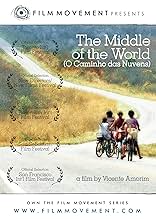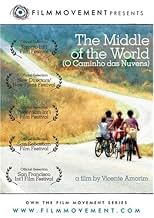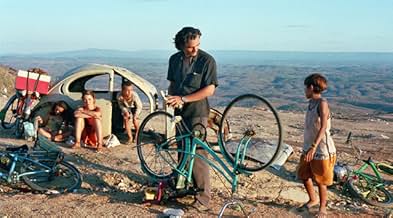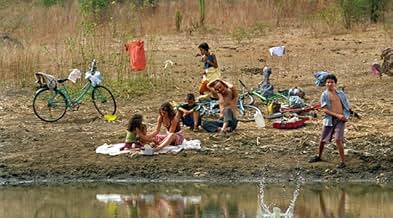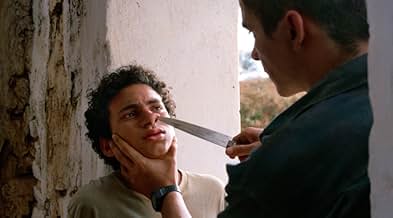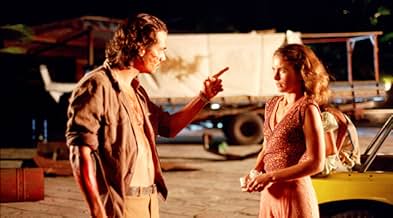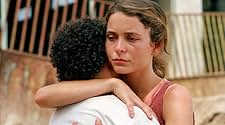IMDb-BEWERTUNG
6,5/10
1261
IHRE BEWERTUNG
Füge eine Handlung in deiner Sprache hinzuA man and his family travel 3200km (1984 miles) by bicycle, from the State of Paraíba to Rio de Janeiro, Brazil, in search of a job.A man and his family travel 3200km (1984 miles) by bicycle, from the State of Paraíba to Rio de Janeiro, Brazil, in search of a job.A man and his family travel 3200km (1984 miles) by bicycle, from the State of Paraíba to Rio de Janeiro, Brazil, in search of a job.
- Regie
- Drehbuch
- Hauptbesetzung
- Auszeichnungen
- 1 Gewinn & 9 Nominierungen insgesamt
Manoel Sebastião Alves Filho
- Rodney
- (as Manoel Sebastião)
Felipe Newton Silva Rodrigues
- Clévis
- (as Felipe Newton)
Cícera Cristina Almino de Lima
- Suelena
- (as Cristina de Lima)
Cícero Wesley A. Ferreira
- Cícero
- (as Cicero Wallyson e Ciceero Wesley)
Alexandre Zacchia
- Porfirio
- (as Alexandre Zachia)
Empfohlene Bewertungen
May be the summary say it all but the movie it's so great that I'm gonna give interested people more info about it. Is the first time in the latinamerican movie history when a director make a movie about being poor is not a terrible drama, it's just life, nothing more and nothing less. You can watch how is it the Latin American way to live the poverty: It's a daily drama that everybody lives each day of their life and that make's life less dramatic. In the movie you can found a typical family and the play of each character are the same in every place in the world without differences of social class. In the film you can make a road-trip from the north to the south of Brazil but without the typical beach and sun scenery. No, here it is another part of Brazil, that part where the real people live and tourism don't show. Incredible characters and fantastic places.
A great Brazilian movie called "The Middle of the World", which, in fact, it is in so many ways. It is a rich but unpretentious chronicle of an extraordinary journey of one rural Brazilian family. The father is illiterate and unable to find work. Romão (the father), Rose(the mother), and their five children, from a teen to a baby, begin to make a journey on bicycles and head for Rio de Janeiro, which is 2,000 miles away, to find work. They face all kinds of physical and emotional hardships along the way, seeing many kinds of villages, dirt roads and superhighways, and desolate to spell binding scenes of nature. They beg, do odd jobs, sing in outdoor cafés for money, scrounge around in old abandoned homes, swelter under the blazing sun, almost die of thirst, and sleep under the stars; yet all the while, they keep trying to survive and maintain their love for each other, which is often tested beyond limits. The husband and wife relationship has classic features that are displayed poignantly and expertly. They exhibit a kind of yin and yang pattern with Romão being a strong, soft spoken, intensely patient, idealistic optimist and Rose being the one who verbalizes their feelings of love, sympathy, joy, as well as despair, fear, and anguish. She is also outspoken when their frailties have been overtaxed and when there is a need to be practical. Her pragmatism and his religious convictions balance each other out. Nevertheless, they are able to switch roles as the one to comfort, encourage, or recommit to the challenge when either has had enough and is losing hope and faith in their vision. With no competition from age-group peers, the character of their parents seems to be emulated as role models by the children. As a sub-plot, the teenager, Antonio, is in the middle of growing into manhood. The Father, Romão, exercises patient parental control through mild rebukes and testing Antonio's mettle by letting him use his judgment and make mistakes, but he also subtly guides him with silent looks of acknowledgement that builds Antonio's confidence in himself. Rose, the mother, gives equal guidance by emphasizing caution and protectiveness but also gives him a sense of profound mother-love that becomes his foundation of security. When the father senses Antonio is ready to emancipate, the mother does not want to let go and the father, in his wisdom-love, states simply and firmly to Rose, "We do not own our children." When Antonio is left behind to follow an occupation, the strong and positive family dynamic continues to the end of their journey. Finally, when at their destination of Rio de Janeiro, and expressing the powerful spirit of this family, their triumph is symbolized in a mountain top experience as they stand together viewing Corcovado's Statue of the Christ and overlook the prize of their victory, the city of their dreams. As they crossed the 2,000 miles of their courageous journey, they witnessed the many ways in which the nation they once knew is rapidly changing. It was a raw, earthy, beautiful story. It gave such a realistic picture of Brazil as a whole. It is a beautiful country but also has such vast differences between the rich and poor. The movie also showed what a big and truly dominant role religion, and religious superstitions, plays in the lives of the poor, illiterate 'peasants'. At 'The Middle of the World', two different worlds, the new cosmopolitan and the old world, stand on the same piece of earth!
10lexicon8
I loved this movie!
It is so refreshing to watch a non-pretentious film that illustrates the realities of poverty and the search for happiness without making you want to jump out of the nearest window!
Normally, Latin American directors tend to emphasize and exoticize poverty-stricken towns and characters by dwelling on the families' strife and hardship in order to extract superficial emotion from the spectator. Mr. Amorim, however, deftly maneuvers around these themes with a sincere and compassionate and humanistic eye.
"O Caminho das Nuvens" is a funny and modern road-movie that takes you where you want to go...places you may have been before, but may not have seen in such a fresh and authentic way. Muito bom.
It is so refreshing to watch a non-pretentious film that illustrates the realities of poverty and the search for happiness without making you want to jump out of the nearest window!
Normally, Latin American directors tend to emphasize and exoticize poverty-stricken towns and characters by dwelling on the families' strife and hardship in order to extract superficial emotion from the spectator. Mr. Amorim, however, deftly maneuvers around these themes with a sincere and compassionate and humanistic eye.
"O Caminho das Nuvens" is a funny and modern road-movie that takes you where you want to go...places you may have been before, but may not have seen in such a fresh and authentic way. Muito bom.
10annepg
Rarely does one have the opportunity to see such a unique, honest and beautiful movie, specially when it comes to dealing with such difficult issues such as poverty, a family's struggle to stick together and overcome all sorts of misadventures. This is a beautifully shot road movie on bicycles - based on a true story - that can be compared to The Bicycle Theif, and another Brazilian master piece by Nelson Pereira dos Santos: Vidas Secas (Barren Lives, is the English title) (based on a novel). Everyone should get to see this movie.
This is a hypnotic Brazilian film. Directed by Vicente Amorim, it's set in the wide open expanses of the North of the country as a poor family is seen traveling toward Rio on bicycles. The movie gives us a sense of the enormity of some of the arid landscape the family traverses in order to get to a place where the father, Romao, could get a decent job that would pay him, at least, a sum, that in his mind will be enough to take care of his wife and five children.
The movie is made so appealing by the cinematography of Gustavo Hadba, whose camera loves to show the emptiness of the regions the family is seen traversing. The music of Andre Abujamra blends perfectly with the action.
The only thing that is incomprehensible is the way that Romao will not try to get a job, doing whatever, to support his family. Romao is a stoic father who believes his problems will be solved when they arrive in Rio, but along the way, he shows he is a beaten man who will let his family perform for whatever coins are thrown at them, and even starve, without moving a finger to remedy the situation. At the same time, Romao shows a faith in the miraculous Father Cicero, whose sanctuary they visit along the way, but alas, when opportunities arise, Romao doesn't take advantage of them.
The suffering mother Rosa is a model of loyalty to her husband. Even if she knows that it's because of Romao they are in the position one sees them. Antonio, the oldest son, is clearly an intelligent boy who will make it in life because he appears to have a resolve that will fight to survive.
The director got good performances all around from his cast. Wagner Moura, Claudia Abreu and Ravi Ramos Lacerda, the three principals, are perfect in their roles.
The film will not disappoint because it shows a good director at the helm.
The movie is made so appealing by the cinematography of Gustavo Hadba, whose camera loves to show the emptiness of the regions the family is seen traversing. The music of Andre Abujamra blends perfectly with the action.
The only thing that is incomprehensible is the way that Romao will not try to get a job, doing whatever, to support his family. Romao is a stoic father who believes his problems will be solved when they arrive in Rio, but along the way, he shows he is a beaten man who will let his family perform for whatever coins are thrown at them, and even starve, without moving a finger to remedy the situation. At the same time, Romao shows a faith in the miraculous Father Cicero, whose sanctuary they visit along the way, but alas, when opportunities arise, Romao doesn't take advantage of them.
The suffering mother Rosa is a model of loyalty to her husband. Even if she knows that it's because of Romao they are in the position one sees them. Antonio, the oldest son, is clearly an intelligent boy who will make it in life because he appears to have a resolve that will fight to survive.
The director got good performances all around from his cast. Wagner Moura, Claudia Abreu and Ravi Ramos Lacerda, the three principals, are perfect in their roles.
The film will not disappoint because it shows a good director at the helm.
Wusstest du schon
- WissenswertesCarol Castro's debut.
- VerbindungenReferenced in A Dona da História (2004)
Top-Auswahl
Melde dich zum Bewerten an und greife auf die Watchlist für personalisierte Empfehlungen zu.
Details
- Erscheinungsdatum
- Herkunftsland
- Offizieller Standort
- Sprachen
- Auch bekannt als
- The Middle of the World
- Drehorte
- Produktionsfirmen
- Weitere beteiligte Unternehmen bei IMDbPro anzeigen
Box Office
- Weltweiter Bruttoertrag
- 13.278 $
- Laufzeit1 Stunde 25 Minuten
- Farbe
- Sound-Mix
- Seitenverhältnis
- 1.66 : 1
Zu dieser Seite beitragen
Bearbeitung vorschlagen oder fehlenden Inhalt hinzufügen

Oberste Lücke
By what name was O Caminho das Nuvens (2003) officially released in India in English?
Antwort

